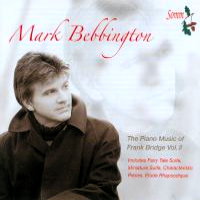
Pride of Place
Piano music by
Frank Bridge -
praised by
HOWARD SMITH'A standing ovation for Mark Bebbington ...'
|

|
Mark Bebbington's exquisite recital of Frank Bridge's piano music (Vol 2) skyrockets to a top rung among new recordings to have come my way in 2008.
This marvellous repertoire fits the pianist like a glove and his conspicuous affinity with Bridge's wonderfully crafted miniatures will hopefully attract a wider appreciation of music which has hitherto been so woefully neglected.
Listen -- Bridge: Fire Flies (Characteristic Pieces)
(track 24, 0:00-0:35) © 2008 Somm Recordings
Indeed Bebbington's attention to British piano works (eg Constant Lambert, Malcolm Arnold, John Ireland) usually sidelined by the big-name pianists is deserving of unstinting applause.
In this case Somm Records (founded 1995) have financial assistance from the Royal College of Music Frank Bridge Bequest.
The only comparable young advocate is much praised British pianist Ashley Wass with his CDs of Bridge (plus Bax, Alwyn and Elgar) for Naxos.
Having managed to hear both Somm and Naxos in these items I'd give pride of place to Bebbington for though both artists perform with laudable distinction, Somm's man has an extra degree of the pianistic 'X' factor.
Somm's 77+ minute CD was recorded in the CBSO Centre in January 2007 and it found Bebbington in sparkling, attentively-considered form.
The miracle throughout is in discovering keyboard music of such stellar calibre from Bridge (1879-1941); best known for his orchestral poem, The Sea (1911), the Oration for cello and orchestra (1930) and a body of chamber music.
The opening four-item Fairy Tale Suite, written in the autumn of 1917, has a beguiling piquancy, totally at variance with the barbarism of war then raging in Europe. As note-writer Lewis Foreman observes it has much in common with Ravel's Ma Mère l'Oye.
Listen -- Bridge: The Spell (Fairy Tale Suite)
(track 3, 0:00-0:53) © 2008 Somm Recordings
In Autumn (1924) has a broader, more sombre eloquence; a consequence of Bridge's growing compositional development and his inner distress following the mad 1914-18 slaughter of so many friends.
The economy and finesse Prokofiev and Bartók brought to what is usually thought of as children's music for piano is here also in Bridge's Miniature Pastorals (Set 1, 1917), one set of three. Bebbington plays these simple boy-girl vignettes with disarming restraint.
By contrast there's alternate directness and grandeur in the brief, chromatic Etude Rhapsodique (1905).
Graziella (1926) brings order out of fragments showing Bridge at his most compelling and idiosyncratic; as if watched through mists at twilight.
In 1905 Walter Willson Cobbett (1847-1937) established a series of chamber music competitions intended to spotlight young British composers and to encourage the composition of short ensemble works.
In the following years he commissioned concise works that came to be known as Cobbett 'Phantasies'; an archaic spelling referring to an instrumental form flourishing in the period between 1603 and 1714.
Listen -- Bridge: Dramatic Fantasia
(track 12, 9:04-10:04) © 2008 Somm Recordings
This was a form at which Bridge excelled as in his Dramatic Fantasia (1906), an atypically extravagant, somewhat Lisztian 12+ minute sonata.
Three Pieces for Piano (a. Columbine; b. Minuet; c. Romance) is a compilation of short works which emerged as far apart as 1901 and 1913; perfect recital fare, lasting 9 minutes 5 seconds.
First performed in Wigmore Hall (then Bechstein Hall) in 1905, A Sea Idyll belongs alongside a shortlist of orchestral works which (to my mind) in some way or another conjure marine-scapes. They are the Hebrides Overture (1830), Debussy's La Mer (1905), Tintagel (1919) and Britten's Four Sea Interludes (Peter Grimes, 1945).
Within Somm's entire treasury of Bridge's work, the former is a 24 carat item -- perfect, moving, and performed with loving absorption.
The Miniature Suite was assembled and given names by music producer and broadcaster Paul Hindmarsh (born 1952) working from the composer's sketches (1921) found at the Royal College of Music. Despite insouciant moments, notably in the 'Caprice', the overall mode is bittersweet.
Listen -- Bridge: Chorale (Miniature Suite)
(track 17, 1:52-2:52) © 2008 Somm Recordings
Finally the Four Characteristic Pieces (1917) are soulful, inward-looking and shot through with advanced harmonic-chromatic gestures; stamping Bridge's music with a special imprimatur among early 20th century British composers.
A standing (living room) ovation for Mark Bebbington while added to that I cannot praise Somm's role too highly.
Copyright © 17 December 2008
Howard Smith, Masterton, New Zealand
 BUY CLASSICAL CDS ONLINE
CD INFORMATION: THE PIANO MUSIC OF FRANK BRIDGE
BUY CLASSICAL CDS ONLINE
CD INFORMATION: THE PIANO MUSIC OF FRANK BRIDGE
| 
